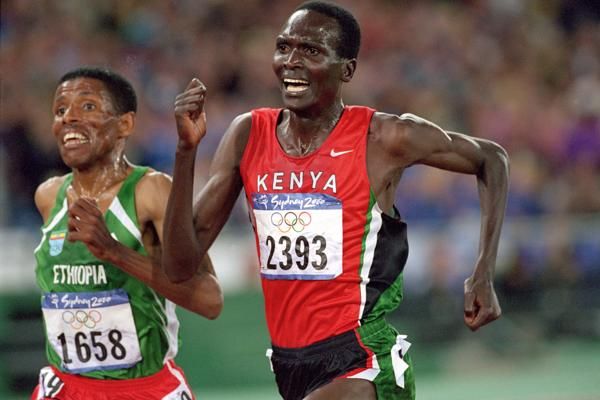In the pantheon of long-distance running, few rivalries have captured the imagination quite like that between Kenya’s Paul Tergat and Ethiopia’s Haile Gebrselassie. Throughout the 1990s, Gebrselassie frequently bested Tergat, none more famously than in the 10,000 meters at the 2000 Sydney Olympics. Recently, Tergat revisited this epic battle, reflecting on why the defeat remains one of the most painful moments of his illustrious career.
Paul Tergat, a five-time world cross country champion, was renowned for his endurance, speed, and tactical acumen. Yet, standing in his way to ultimate glory was Haile Gebrselassie, whose blend of speed, tenacity, and strategic brilliance made him nearly unbeatable on the track. Their encounters were always highly anticipated, epitomizing the intense rivalry between Kenyan and Ethiopian athletes.
The 10,000 meters final at the Sydney Olympics is considered one of the greatest races in Olympic history. As the race began, the atmosphere in the stadium was electric, with fans knowing they were about to witness a clash of titans. Tergat and Gebrselassie had faced each other multiple times before, with Gebrselassie often emerging victorious, including a narrow win in the 1996 Atlanta Olympics. Sydney was Tergat’s chance to change the narrative.
From the start, the race was fiercely competitive. Both athletes stayed with the lead pack, conserving energy for what everyone knew would be a blistering final lap. With each lap, the tension grew, and as they entered the final 400 meters, the pace intensified. Tergat, known for his powerful finishing kick, made his move, sprinting ahead of the pack. Gebrselassie, however, responded in kind, staying glued to Tergat’s shoulder.
As they rounded the final bend, it became a two-man race. Tergat pushed harder, but Gebrselassie matched him stride for stride. In the final stretch, Gebrselassie edged ahead by the smallest of margins, winning by just 0.09 seconds, a mere heartbeat. The photo finish showed Tergat lunging forward, but it wasn’t enough. Gebrselassie had done it again.
Reflecting on this race, Tergat described the defeat as “heart-wrenching.” “I had prepared meticulously for Sydney,” he recalled. “Every training session, every strategy was aimed at beating Haile. To come so close and lose by such a narrow margin was incredibly painful.” The race had taken everything out of both athletes, but for Tergat, the emotional toll was even greater than the physical exhaustion.
Tergat spoke about the deep respect he has for Gebrselassie, acknowledging the Ethiopian’s incredible talent and sportsmanship. “Haile and I pushed each other to our limits. Our rivalry was fierce, but it was also a driving force that made us better athletes. He was a great competitor and an even greater person,” Tergat noted.
The pain of the Sydney defeat lingered, not just because of the close finish, but because it represented another missed opportunity for Olympic gold. “Every athlete dreams of standing on the top step of the Olympic podium. I had come so close in Atlanta and Sydney, but it slipped away both times,” Tergat said. Despite the disappointment, Tergat’s performances at the Olympics and other major competitions solidified his status as one of the greatest long-distance runners of all time.
In the years following Sydney, Tergat transitioned to marathon running, where he found considerable success, including setting a world record in 2003. His resilience and ability to bounce back from setbacks have been a hallmark of his career. “You learn more from your defeats than your victories,” Tergat reflected. “Sydney taught me valuable lessons about perseverance, mental strength, and the importance of never giving up.”
Tergat’s reflections on the 2000 Sydney Olympics highlight not only the agony of coming so close to victory but also the respect and admiration that exists between fierce competitors. His rivalry with Gebrselassie is a testament to the high standards of excellence that define long-distance running and the spirit of sportsmanship that transcends competition.
As Paul Tergat looks back on his career, the pain of the Sydney defeat is tempered by the knowledge that he was part of some of the most memorable moments in athletic history. “Winning isn’t everything,” he concluded. “It’s about how you compete, how you push your limits, and how you inspire others. In that sense, I believe both Haile and I succeeded beyond our wildest dreams.
ALSO READ:Erik ten Hag Determined to Lead Manchester United to Success in the 2024/25 Season


